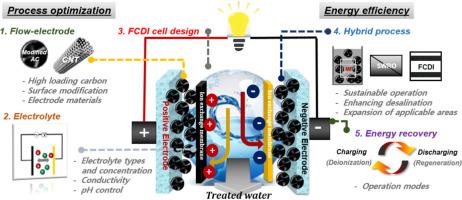Desalination ( IF 8.3 ) Pub Date : 2021-01-14 , DOI: 10.1016/j.desal.2021.114930 Yong-Uk Shin , Jihun Lim , Chanhee Boo , Seungkwan Hong

|
Flow-electrode capacitive deionization (FCDI) is a new electrochemical-based desalination technology that addresses the limitations of preceding CDI processes through the use of a stationary carbon electrode and ion-exchange membrane. As with conventional CDI configurations, non-Faradaic reactions (i.e., ion electrosorption) of the electric double layer model is the principal ion separation mechanism of FCDI. This technology also offers the unique ability for continuous ion/salt separation by circumventing constraints with electrode saturation. This paper reviews recent advances in FCDI, discusses the feasibility and applicability of this technique, and suggests potential niche applications for saline water/wastewater treatment and resource recovery. Additionally, it also critically discusses factors that deteriorate FCDI performance, operating conditions, process energy efficiency, and optimization of the electrode, electrolyte, and cell design. The insights from this review will shed light on directions for future FCDI research and inform the implementation of FCDI technology.
中文翻译:

改善流电极电容去离子(FCDI)的可行性和适用性:审查工艺优化和能效
流电极电容去离子(FCDI)是一种基于电化学的新型脱盐技术,该技术通过使用固定碳电极和离子交换膜解决了先前CDI工艺的局限性。与常规CDI配置一样,双电层模型的非法拉第反应(即离子电吸附)是FCDI的主要离子分离机理。通过克服电极饱和的限制,这项技术还提供了连续进行离子/盐分离的独特功能。本文回顾了FCDI的最新进展,讨论了该技术的可行性和适用性,并提出了用于盐水/废水处理和资源回收的潜在利基应用。此外,它还严格讨论了降低FCDI性能的因素,操作条件,过程能效以及电极,电解质和电池设计的优化。这次回顾的见解将为未来FCDI研究提供方向,并为FCDI技术的实施提供信息。











































 京公网安备 11010802027423号
京公网安备 11010802027423号